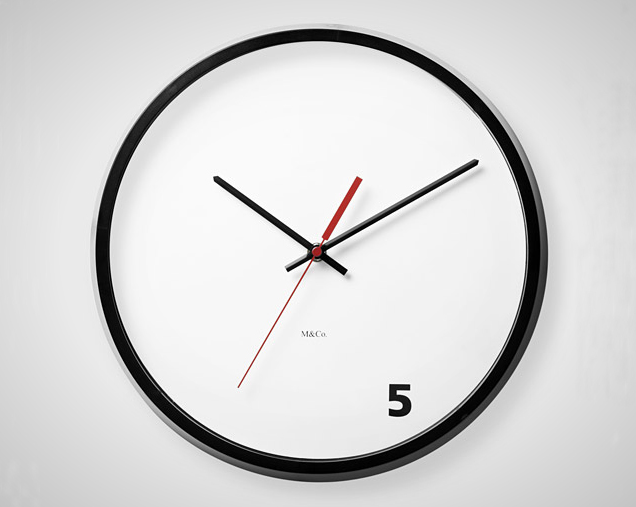The Natural Productivity Cycle
In your personal life, when attending to business or working on side projects, how often do you spend 8 consecutive hours in front of a computer? It doesn’t make sense because we lose the ability to concentrate effectively within a few hours.
Everyone goes through alternating periods of high and low mental acuity. There are days when I work on personal projects for well over 8 hours, but the time is always divided into multiple sessions. I might spend a few hours coding a design, a few hours writing, and a few hours reading feeds, moderating comments, and responding to email.
I work this way because it aligns with my mental energy cycle. Any more than 3 hours in front of a computer and my eyes start hurting and I become restless. I lose the ability to do my best work. Instead of forcing myself to continue, I switch to an activity that allows my mind to recharge. These breaks maximize productivity by eliminating down periods. It’s counter productive to force work when the mental energy isn’t there.
The Problem with an 8 Hour Work Day
A continuous 8 hour work day is a relic of the past. It makes sense for physical labor and manufacturing work, but with information workers it doesn’t account for the mental energy cycle. The ability of a factory worker to think analytically is irrelevant, he’s either cranking widgets or he isn’t.
In the case of the modern information worker, nearly all tasks involve creative or strategic thinking. The way someone answers an email or interprets a piece of information can differ drastically depending on his or her energy level. Nobody does their best work 5:30 in the afternoon after they’ve been sucking down coffee all day to stay awake.
I can’t speak for all workers, but I’ve observed that productivity levels generally peak twice a day — first thing in the morning and shortly after lunch. The most productive period is the beginning of the day. People are capable of creative tasks like writing and solving complex technical problems. After a couple hours of intense work, energy levels drop and workers downgrade to less demanding tasks like responding to email and tinkering with existing creations. Towards the end of the cycle, the mind is so cluttered and drained that workers resort to “work related activities” that appear productive but don’t contribute to the bottom line. The afternoon cycle is similar but the productivity peak isn’t as high. For different people the peaks and valleys will vary, but overall I’d estimate only 3-4 hours a day could be classified as highly productive.
This number isn’t caused by slacking. You can’t force an information worker to be highly productive when the energy isn’t there. Workers can try their hardest, but the work just won’t have that creative edge. The low ratio of highly productive hours to total hours worked is the result of the continuous 8 hour work day.
When workers reach the low energy part of the cycle, they can’t recharge with a non-work activity. The only option is office purgatory. You can’t be highly productive because you’re mentally fatigued, but you can’t recharge because the 8 hour work day requires the appearance of constant productivity. The result is millions of unproductive workers trapped at their desks when they’d rather be doing something else.
Alternative Work Arrangements
The obvious solution to this problem is planning around the mental energy cycle by breaking the work day into multiple segments. The traditional office setting doesn’t accommodate this because there are few available recharge activities. People can’t do household chores, run errands, or engage in recreational activities without leaving the workplace.
Some companies have tried to make the work environment more accommodating by offering meals, fitness centers, and special areas for relaxation. Although these amenities are certainly an improvement, they’re expensive for employers and only partially satisfy employees.
The solution that makes the most sense is a remote work arrangement because it reduces employer costs and allows employees to adjust their work schedule to their mental energy cycle. When a worker becomes mentally fatigued, they can go off the clock and engage in recharge activities that are personally productive like exercise or relaxation. When energy returns, the worker can start working again at a high level, effectively cutting out the low productivity period of the cycle. Employers don’t pay for unproductive time and employees get to work in a more natural pattern that adjusts to their personal lives.
Why isn’t everyone doing this already? Many workers already are, and as commutes get worse and communications improve, the number will continue to increase. Of course there will always be a need for office workers in businesses (like doctor’s offices and law firms) that require daily customer interaction, but for most companies it really isn’t necessary.
There is also the argument that people need to collaborate in person. This is steadily becoming less essential. Most office communications are already done through email or instant messenger. Face to face meetings are certainly necessary, but for the vast majority of lower and mid level employees meetings are the exception and could be conducted via phone/video conference or condensed into one or two days a week.
Another common objection is that employees will abuse remote work arrangements by slacking off. I’m inclined to believe that most adults value their employment enough that this isn’t a problem. In cases where supervision is required, web cams and other technology can used to monitor a worker.
I suspect the real reason remote work arrangements are still the exception is inertia. Companies are used to doing business in the office and are reluctant to change. There is also the presence of office politics. If one person is given a remote arrangement, jealous employees will complain. Doesn’t it make sense to give everyone what they want and save a boat load of cash on office space?
I may only be a kid in his 20’s, but I can tell when something just makes sense. I perceive an increasing number of people are noticing the same phenomena. Forty years from now we’ll be telling our grandchildren about the olden days when everyone’s mommy and daddy went to work in an office.
Erin shows overscheduled, overwhelmed women how to do less so that they can achieve more. Traditional productivity books—written by men—barely touch the tangle of cultural pressures that women feel when facing down a to-do list. How to Get Sh*t Done will teach you how to zero in on the three areas of your life where you want to excel, and then it will show you how to off-load, outsource, or just stop giving a damn about the rest.





Unquestionably believe that which you stated. Your favorite reason seemed to be on the net the easiest
thing to be aware of. I say to you, I definitely get irked while people
consider worries that they just do not know about.
You managed to hit the nail upon the top as well as defined out the whole thing
without having side-effects , people can take a signal.
Will likely be back to get more. Thanks
新しくて高品質の人形は、中古の人形にはない、より楽しくて新しい機能も提供できます。 また、ショップで新品のダッチワイフを購入した場合は、その保証を取得するだけで、保証期間内に問題が発生した場合は製品を交換できます。 爆乳 ラブドール
Excellent blog here! Also your web site loads up very fast! Sex Doll Blog
에볼루션코리아
796qwwzRL{+#
에볼루션카지노
803epTXzE/|;
에볼루션바카라
172eSATnK:::
에볼루션룰렛
603mVDtpB)}|
에볼루션블랙잭246GxhzPF:{@
The best e-cigarette liquid site in Korea. Korea’s lowest-priced 전자담배 액상 사이트 e-cigarette liquid.
스모크밤643 스모크밤
전자담배 액상 사이트 The best e-cigarette liquid site in Korea. smok25 Korea’s lowest-priced e-cigarette liquid. 스모크밤320 스모크밤
제주룸
692vcrxmz}”&
제주셔츠룸
166IvNOcI'{+
제주레깅스룸
575sIxSOP$’!
제주룸싸롱
003mxMLqP{@(
551mUiRCn(~~
첫가입꽁머니
535fZugNv/\#
강남모던바
719AASfvV*!^
가입시꽁머니
452oqVHEP-‘^
가입무료머니
131fwQJbq!,|
강남사설카지노
516OFBwCO^-:
강남카지노
917PiIZHt`(:
강남카지노바
491fuEDSh,”{